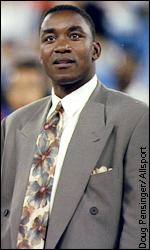
| Monday, January 24
By Frank Hughes
Special to ESPN.com |
|
|  | | Would Isiah Thomas be in D.C. today if not for one Michael Jeffrey Jordan? |
Everyone's excited about Michael Jordan running the Washington Wizards,
right?
Well guess what, Michael Jordan was running the Wizards long before
Tuesday's announcement that he was going to take over operations and get an
ownership stake in the team.
Remember back last summer, when the Wizards were interviewing coaches, and
it was a virtual lock that Isiah Thomas was the next coach? The players all
were saying how great it would be to have an established winner, and how his
attitude would be a big infusion to a virtually dead franchise.
Then, poof, Isiah is gone and Gar Heard is hired because, as Abe Pollin
said, Heard just knocked him over in their interview. As Austin Powers would
say, "Riiiiiiiiight."
Well, at Jordan's press conference the other day, it was revealed that
part-owner Ted Leonsis had contacted Jordan a long time ago, and that these
discussions were an ongoing thing.
A source close to the Wizards told me it is a pretty safe bet that when Leonsis contacted Jordan, it was Leonsis, on Jordan's behalf, that steered the
Wizards away from hiring Thomas, whom Jordan has hated ever since Thomas froze
him out in the All-Star game Jordan's rookie season.
It is unclear if Leonsis had talked to Jordan beforehand and Jordan told
him directly not to hire Thomas, or if the star-struck Leonsis knew of
Jordan's animosity toward Thomas and wanted to avoid either a) not signing
Jordan on at all; or b) having to go through a messy, expensive divorce with
Thomas so that Jordan would sign on. But there clearly was a change of
attitude toward Thomas during the interview process, which coincides directly
with Leonsis's negotiations with Pollin.
How's that for the ultimate revenge?
And don't be surprised if more revelations like this come up in the
not-too-distant future.
There are some things that I simply cannot, for the life of me, envision
in my mind's eye, no matter how far I attempt to contort my imagination.
For instance, I cannot picture $90 billion, nor can I think of what,
precisely, you would do with it.
Not that I've ever tried, I swear, and I will deny it if you ever ask me,
but I somehow cannot fathom Hillary Clinton naked.
And I just can't see Jordan become a downtrodden, executive failure.
I mean, come on, does anyone truly believe that even with all the bumbling
idiocy that has enveloped the Wizards/Bullets organization over the better
part of modern time, Jordan is going to be some kind of Elgin Baylor clone,
stripped of all his decision-making abilities by a fuddy-duddy owner, to
become a puppet, a figurehead?
No way. For one thing, Jordan does not have that type of personality.
And for another, there are too many people who want Jordan to succeed, who
have a vested interest in his accomplishments. And when that many people want
a person to succeed, it is going to happen, come hell or high water.
John Steinbeck's book, "The Winter of our Discontent," is about a small
town trying to expand into a larger city, and the only way for that to happen
is for the town's businessmen to undermine the existing governmental
establishment by getting them arrested for all the petty corruption that
happens as a matter of course in any city. Once that happens, expansion goes
forth, and all the businessmen now in positions of power benefit financially.
I admit that I am a conspiracy theorist, but I've got a pretty good hunch
that those types of behind-the-scenes theatrics are taking place with the
Jordan ownership thing.
Because let's face it, this thing cannot be about the money. The numbers
just don't add up. So let's say Jordan is going to, in the end, get 15
percent ownership of a franchise worth $210 million. That is $31.5 million.
Jordan made more than that in his final year of playing, when he stuffed
$36 million into his coffers. In fact, Jordan made that much in the first 72
games of that season.
He makes that now annually in endorsements with Nike, MCI, Hanes,
McDonald's and whatever else he shamelessly throws his name on. Why does he
need $31.5 million to own part of a franchise that has become a joke around
the league?
I'll tell you why: Because this is going to be a no-lose situation for
him, and it is only going to further his reputation as a miracle worker.
This guy has gotten preferential treatment his entire career. In his book,
"Jordan Rules," Sam Smith documents several instances of the way in which
Jordan was treated differently than his Chicago Bulls teammates.
For instance, when a player was sick, he was required to come to the
team's facility and get treatment and medicine from the team trainer. With
Jordan, the trainer went out to his house.
If Jordan was late for the team bus, somebody would go up to Jordan's room
and get him. In one case that Smith writes about, Sam Vincent and Charles
Davis were 30 seconds late for the bus, but walking through the hotel lobby
toward it, when it pulled away from the curb and left them standing there.
Players always complained in games that Jordan got virtually every foul
call by the officials, even when he was barely touched.
You think any of that is going to stop now? Fat chance.
Speaking of fat, who's the Rhodes Scholar that made these dietary
supplement commercials that spend 30 seconds telling you about the product,
then then next 15 minutes explaining the side effects? I swear, I was
watching TV the other day when one of these commercials comes on and tells me that if I take this supplement, it will help me lose weight. Sure, but it
also may cause me to have an "uncontrollable oily discharge." Are you
freaking kidding me? An "uncontrollable oily discharge," and they actually
want me to buy this crap. Jordan could come over my house, endorse this
stuff, tell me all about his "uncontrollable oily discharge," and I still
wouldn't touch it.
Back to the Wizards, though, whose deal with Jordan reeks of an "oily
discharge."
Doesn't it seem like more than coincidence that these discussions have
been going on for a while now, and it was just last month that Washington was
named as the site for the All-Star game next year?
Those are the types of behind-the-scenes things I am talking about. Now I
am not going to say that commissioner David Stern is going to blatantly break
any rules to accommodate Jordan, but I will suggest that I would not be
surprised if Stern bent a few rules to facilitate Jordan's success.
It's not as if it would be unprecedented. In fact, it has happened with
this very franchise. Juwan Howard would be a power forward for the Miami Heat
right now except that Stern "interpreted" the rules the way he wanted to and
handed Howard back to the Wizards.
Somehow or other, the New York Knicks, who reside in King David's back
yard, were given the opportunity to interview Latrell Sprewell when other
teams weren't.
And though it never has been proven, the cold envelope theory still
occasionally comes up when the 1984 draft is discussed. That, of course, is
when the Knicks acquired Patrick Ewing.
I don't know how it is going to be done, but somehow Stern is going to
bend or reinterpret or insert a special clause that will benefit Jordan's
rise to NBA mastermind.
Look, when the new collective bargaining agreement came out, there was a
special rule put in that would allow for Jordan to come back and make as much
money as he wanted. It benefited a few other players, but it was put in for
Jordan's benefit.
How about this rule change, which would be the ultimate in Jordan helping
the Wizards become successful? Magic Johnson had to sell his five percent
stake in the Lakers during his comeback because there is a rule that
precludes ownership from playing.
What if Stern waives that rule and you have a starting lineup of Jordan,
Howard, Rod Strickland, Mitch Richmond and Jahidi White?
People buy all sorts of season tickets, the MCI Center is sold out for the
next 10 years, the franchise is now worth $500 million and Jordan's 15
percent stake suddenly goes up to $75 million.
And Isiah Thomas is stuck owning the CBA.
Frank Hughes covers the NBA for the Tacoma (Wash.) News-Tribune. He is a regular contributor to ESPN.com. |  |



 Aldridge: Dissecting Jordan's return
Aldridge: Dissecting Jordan's return